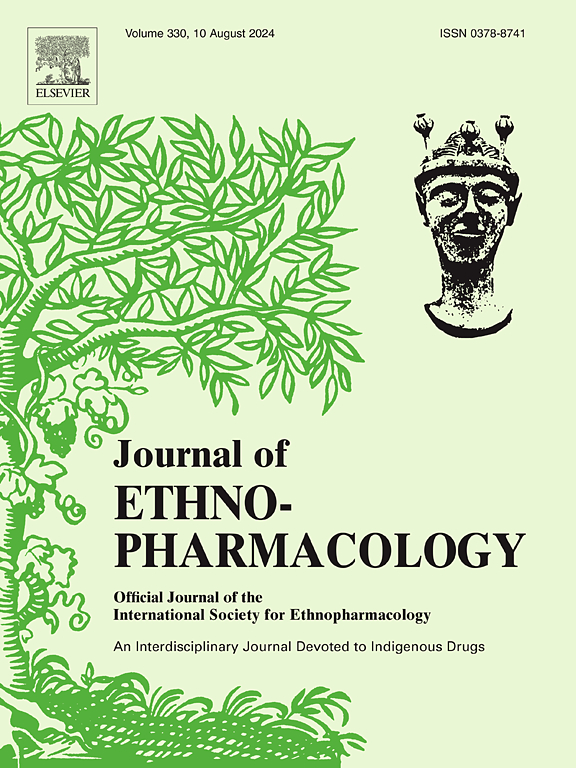转录组学分析及实验验证逍遥散治疗肠易激综合征合并抑郁症的作用机制。
IF 4.8
2区 医学
Q1 CHEMISTRY, MEDICINAL
引用次数: 0
摘要
民族药理学意义:消遥散是一种经典的中药复方,最早记载于《太平惠民和剂局方》。传统上,它被用于治疗肠易激综合征(IBS)和抑郁症。然而,它治疗肠易激综合征患者抑郁症状的作用机制仍不清楚:本研究旨在通过转录组分析和药理实验,研究XYS对IBS肠道症状和抑郁症状的影响,并探索其作用机制:通过慢性不可预测的轻度应激和胃内番泻叶刺激联合诱导小鼠 IBS。我们评估了六项抑郁指标,用苏木精、伊红染色法和透射电子显微镜检查了结肠组织,用 Western 印迹法分析了相关蛋白质,并对脑组织和肠组织进行了转录组学研究。通过对转录组结果进行网络分析,推测了可能的作用机制,并利用肠易激综合征模型进行了进一步验证:结果表明,XYS能恢复小鼠体重,减轻肠道症状和敏感性,抑制绒毛脱落和萎缩,增强肠粘膜屏障的完整性。值得注意的是,XYS 减少了抑郁样行为。转录组分析结合药理实验发现,XYS抑制了肠道ACT1/TRAF6/P38MAPK/AP-1信号通路相关蛋白的表达,同时激活了大脑的DRD2/TH信号通路,增加了大脑中多巴胺的释放:结论:XYS可通过肠道ACT1/TRAF6/P38MAPK/AP-1信号通路和大脑DRD2/TH信号通路调节脑肠轴功能,改善肠道功能和IBS模型小鼠的抑郁症状。本文章由计算机程序翻译,如有差异,请以英文原文为准。

Transcriptomic analysis and experiment to verify the mechanism of Xiaoyao San in the treatment of irritable bowel syndrome with depression
Ethnopharmacological relevance
Xiaoyao san (XYS) is a classic traditional Chinese medicine compound first recorded in "Taiping Huimin Heji Ju Fang". Traditionally, it is used to treat irritable bowel syndrome (IBS) and depression. However, its mechanism of action in treating IBS patients with depressive symptoms is still unclear.
Aim of the study
This study aimed to investigate the effects of XYS on intestinal and depressive symptoms in IBS and explore the mechanisms through transcriptomic analysis and pharmacological experiments.
Materials and methods
IBS was induced in mice through a combination of chronic unpredictable mild stress and intragastric senna leaf stimulation. We evaluated six depressive parameters, examined colon tissue with hematoxylin and eosin staining and transmission electron microscopy, analyzed related proteins using western blotting, and performed transcriptomics on brain and intestinal tissues. The possible mechanism of action was speculated by network analysis of transcriptome results and further verified using the IBS model.
Results
The results show that XYS restored mouse weight, reduced intestinal symptoms and sensitivity, suppressed villous loss and atrophy, and enhanced the integrity of the intestinal mucosal barrier. Notably, XYS decreased the depression-like behavior. Transcriptomic analysis combined with pharmacological experiments revealed that XYS inhibited the expression of proteins related to the intestinal ACT1/TRAF6/P38MAPK/AP-1 signaling pathway while activating the brain's DRD2/TH signaling pathway and increasing dopamine release in the brain.
Conclusions
XYS may regulate the brain-gut axis function and improve intestinal and depressive symptoms in IBS model mice through the intestinal ACT1/TRAF6/P38MAPK/AP-1 signaling pathway and the brain DRD2/TH signaling pathway.
求助全文
通过发布文献求助,成功后即可免费获取论文全文。
去求助
来源期刊

Journal of ethnopharmacology
医学-全科医学与补充医学
CiteScore
10.30
自引率
5.60%
发文量
967
审稿时长
77 days
期刊介绍:
The Journal of Ethnopharmacology is dedicated to the exchange of information and understandings about people''s use of plants, fungi, animals, microorganisms and minerals and their biological and pharmacological effects based on the principles established through international conventions. Early people confronted with illness and disease, discovered a wealth of useful therapeutic agents in the plant and animal kingdoms. The empirical knowledge of these medicinal substances and their toxic potential was passed on by oral tradition and sometimes recorded in herbals and other texts on materia medica. Many valuable drugs of today (e.g., atropine, ephedrine, tubocurarine, digoxin, reserpine) came into use through the study of indigenous remedies. Chemists continue to use plant-derived drugs (e.g., morphine, taxol, physostigmine, quinidine, emetine) as prototypes in their attempts to develop more effective and less toxic medicinals.
 求助内容:
求助内容: 应助结果提醒方式:
应助结果提醒方式:


